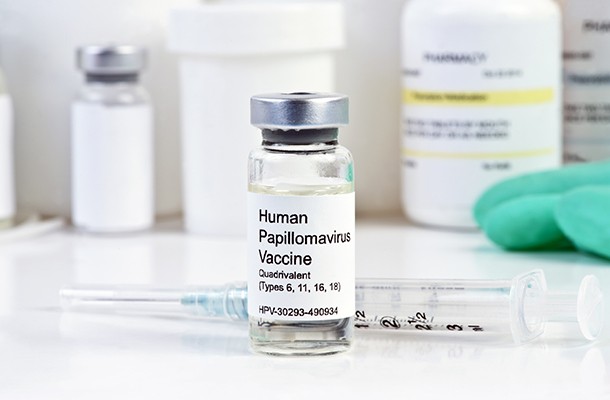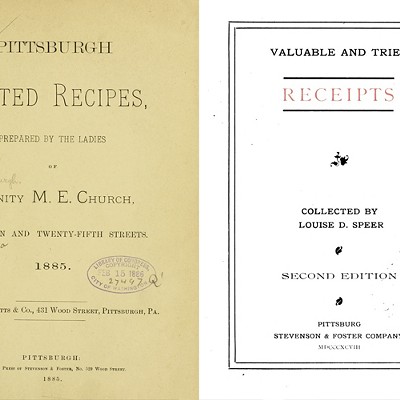Thursday, October 20, 2016

At a meeting of area social service agencies and nonprofits today, as part of YWCA's Week Without Violence,organizations shared the resources they're using to prevent domestic and sexual violence. The event was put together in collaboration with Southwest PA Says No More, a local chapter of the No More campaign created by the FISA Foundation, Heinz Endowments and the United Way of Allegheny County to focus on prevention-focused work to stop gender-based violence.
"YWCA Greater Pittsburgh was thrilled to partner with Southwest PA Says No More to host the program today with the overall theme of Facing Violence Among Men," says Chaz Kellem, senior director of advocacy for race and gender equity for YWCA's Center for Race and Gender Equity. "The hope was to collaborate and learn about programs that are working with men and boys towards ending domestic and sexual violence...It is our hope that it will help build and strengthen relationships and explore possibilities for collaboration."
While several participants at the Oct. 20 event talked about resources they use to work with adults, most talked about educational resources for working with children. George Fleming is a batterer intervention specialist who works with men who have been court ordered to seek treatment for violent behavior. He says prevention programs in schools are key to ensuring fewer men come through his doors.
"The majority of the men in the group have never had education," Fleming says. "These types of subjects are taboo. If you don't go down to the board of education and demand some education in these schools you are moving backwards."
One popular gender violence prevention education training program used by high school athletic coaches is Coaching Men into Boys. Another is MVP Strategies, which is used in local charter schools like Urban Pathways and City High Charter.
MVP uses scenario-based intervention training. For example, one scenario would ask students what they would do in a situation where a group of friends are making homophobic remarks.
Chris McAneny, executive director of Educating Empowering Eliminating Dating Violence, says these programs can only be effective if everyone in a school is participating.
"If the teachers, administrators and principals aren't on board, we're losing opportunities to teach everyday," McAneny says.
According to Southwest PA Says No More, 44 percent of reported sexual assaults take place before a victim turns 18. That's why the organization is hoping national attention on addressing sexual assault on college campuses will find it's way to middle and high schools.
"There's been a lot of great work happening at our colleges around sexual violence," says Kristy Trautmann, executive director of the FISA Foundation. "So what we've been looking at is taking what works and moving it down to our middle and high schools."
Tags: YWCA , Pittspurgh , Southwest PA Says No More , FISA Foundation , Donald Trump , Image
Thursday, August 4, 2016
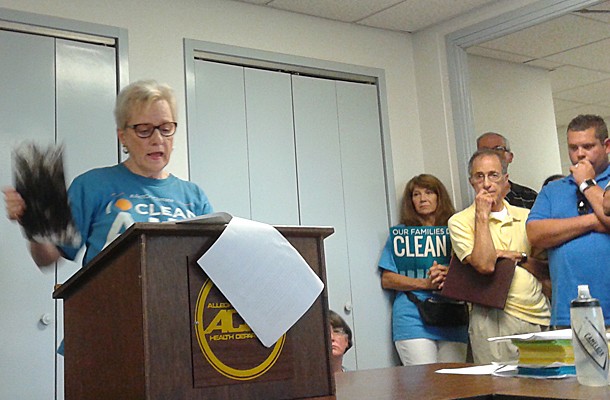
On Monday night, about 100 people crammed into a small, stuffy room at the Allegheny County Health Department's air-quality offices, in Lawrenceville, to testify on a proposed permit for the Cheswick coal-fired power plant, which sits along the Allegheny River in Springdale.
Plant employees and union members pleaded with the health department to recognize that the permit would hurt the power plant economically, while residents living near or upwind of the facility urged the department to recognize pollution's cost on human health.
"We do not oppose reasonable regulations," said Kenn Bradley, a worker with the International Brotherhood of Electrical Workers Local 29, in his public testimony. "We all want clean air, but the plant workers are very concerned that the proposed Title V permit from the county would increase operating costs and ... puts the Cheswick power station at an economic disadvantage with respect to taxpayer-subsidized renewables and other power plants outside of the county."
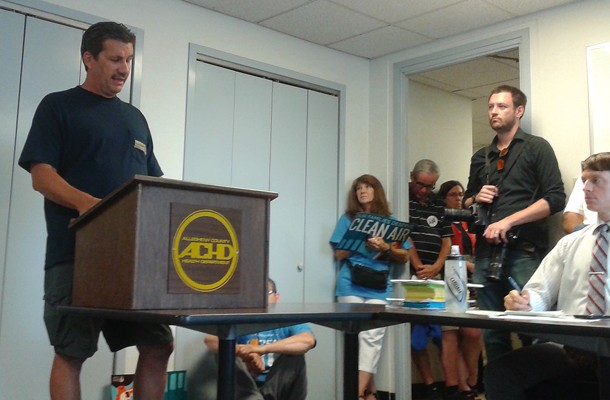
The proposed permit tightens the amount of sulfur dioxide (SO2), nitrogen oxide (NOX), particulate matter smaller than 2.5 microns (PM2.5) and sulfuric-acid mist that the plant's owner, GenOn, can emit. Comparing the plant’s former permit to the new draft, health-department deputy director Jim Thompson says the amount of allowable SO2 would decrease by 59 percent; allowable NOX by 48 percent; PM2.5 by 25 percent; and sulfuric-acid mist by 80 percent. The permit would also require the plant to run its pollution-reducing equipment most of the time.
The plant has not been running at full capacity, and its emissions levels have been below its current allowable limits. But Thompson says that if the plant ran at the same rate as it did in 2014, NOX emissions should be reduced by about 70 percent.
According to the U.S. Environmental Protection Agency, SO2, sulfuric-acid mist and NOX released into the atmosphere cause acid rain and form ozone (which forms smog). Exposure to SO2 can also affect the respiratory system, causing asthmatic symptoms. Also, the EPA says, “numerous scientific studies connect particle pollution exposure to a variety of health issues” including reduced lung function, asthma attacks, heart attacks and premature death in those with lung or heart disease. These pollutants can travel in the wind for long distances, affecting surrounding areas, even in other states.
That's why several residents testified in support of the new permit.
"How many of us need clean air to breathe, to live? We have a responsibility. We are showing our responsibility and saying, 'Please do your best for us,'" Dianne Peterson, who lives roughly ten miles from the plant, said to health-department staff present at the hearing. "Because when you get sick, what wouldn’t you do to get your health back? It’s your kid, your body, your spouse, your asthma, your cancer. It’s all of our responsibilities, and we’re handing it to you and saying, ‘Please take it to the most stringent level you can to protect all of us.’”
A resident who lives across the street from the plant, Marti Blake, waved around photographs of black dust that builds up on her patio. "I'm consistently cleaning coal particles."
While several comments took an emotional tone about the economy and health, local air-quality watchdog Group Against Smog and Pollution, which has previously worked on regulations for Cheswick, read a statement — and submitted written comments — regarding whether the health department is consistently following the EPA's SO2-measurement rules.
"The Rule expressly requires that 'the air agency [emphasis in original] shall conduct the modeling analysis' if it chooses to use air dispersion modeling to characterize peak 1-hour concentrations of SO2 in areas effected by emissions from a source that is subject to the Rule," GASP executive director Rachel Filippini read from her written statement. (CP obtained a copy after the hearing.) "Section V.A.1.u [of the permit] would violate the Rule by allowing the Plant’s operator to conduct the air dispersion modeling. To comply ... ACHD, the air agency with jurisdiction over the Plant, must be the one to conduct air dispersion modeling pursuant to the Rule."
In its written statement, emailed to CP after the hearing, power company NRG — which recently acquired GenOn — contends that its already doing environmentally responsible work because it installed pollution-reducing equipment.
"GenOn, now a subsidiary of NRG, has spent more than $400 million on emissions control equipment at the Cheswick plant since 2003, and has dramatically improved the plant’s environmental footprint," said a written statement emailed by David Gaier, NRG spokesperson. "The plant is, and has been in compliance with all applicable environmental laws and regulations including all statewide standards established by PA DEP. We look forward to continue working with the ACHD to arrive at a permit that is fair, environmentally responsible, and keeps the station on an equal footing with other generators across the state."
According to the health department's press officer, Melissa Wade, the public record of the hearing will be available on the department's website within a few days.
Tags: Cheswick Generating Station , Allegheny County Health Department , Image
Thursday, July 7, 2016
At a press conference last week, PWSA provided an update on efforts to address these concerns and replace incompatible AMI units in Pittsburgh homes. While the focus of the conference was on PWSA’s customer service issues, in light of growing concerns over water quality nationwide, they also provided information on lead levels in city water.
“The basic assumption with both was that we have problems,” said Mayor Bill Peduto. “They are a part of an aging infrastructure of an old steel town that is still here as we move into the 21st century."
Peduto said the authority has to put two actions into place to fix what they’re dealing with now and to further prevent issues: number one, make the branch’s operations transparent, and number two, approach future problems head on and with common sense.
At the press conference last week, David Donahoe, PWSA's interim director, told an anecdote about personally calling the water authority and spending five minutes on the line before speaking with anybody. But PWSA is seeing progress. Previously, 12 percent of PWSA callers hung up the phone before speaking with an operator. That number is now down to 2 percent, with waiting times around less than one minute.
“We are, obviously, a customer-based utility, and therefore being able to serve the customers and respond to them in a more timely basis is very important to us,” said Donahoe.
A task force has been assembled at PWSA to create an AMI plan, which Donahoe said should have been done prior to any installation. April, May and June of this year have been normal billing cycles for PWSA customers, as compared to last year, he said.
Outside of residential cases, around 1,000 meters in commercial settings will be replaced in total. So far, 400 have been replaced. Replacement requires shutting down all water in the business.
Donahue also explained that payment arrangements are being made for late bills exceeding a certain cost. A bill of up to $50 is a one-time payment; in the $50 to $200 range, payments are split between three months; bills of more than $200 are split into six payments.
On the subject of water quality, Peduto said water leaving the testing facility is lead free, so lead contamination occurs somewhere between facility and faucet.
Mandatory lead tests take place in Pittsburgh every three years. The last test was done in 2013 to determine overall lead content in the city’s water. The results from these test indicate an increase over time: 2001 showed 6 parts per billion; 2004, 9.5 parts per billion; 2007, 9 parts per billion. 2010, 10 parts per billion; 2013, 14.8 parts per billion.
The Environmental Protection Agency's action level for lead in water is 15 parts per billion.
“That should have raised a red flag,” said Peduto. “When you go from 6 to 14.8 on mandatory testing in a 12-year period and you know that 15 is the EPA guideline. We should have been having this press conference back then.”
The city offers free customer-requested lead-testing services. Participants are given a bottle that they fill and return to the PWSA, which is sent to an independent lab. The program has received 1,065 requests, and 454 completed tests have been returned.
Of those returned, 225 were non-detected for lead content. Donahoe said that the units tested were from random places throughout the city.
Of the remainder, 72 units tested at 1 to 5 parts per billion, 52 at 5.1 to 9.9 parts per billion, 24 at 10 to 14.9 parts per billion and 20 at 15 plus parts per billion.
Correction: The story initially stated that PSWA's call center employed 250 people. While PWSA employs a total of 250, 30 employees work in the call center.
Tags: PWSA , water bill , water quality , lead , Image
Friday, June 24, 2016
Human papillomavirus, or HPV, is the most common sexually transmitted disease, according to the Centers for Disease Control and Prevention, which along with the American Academy of Pediatrics recommends the three-dose (over a period of six months) vaccine at that age, meaning before kids generally become sexually active.
More than 25 speakers — including doctors, researchers, executives from health-care foundations, high school students, cancer survivors and even a dentist — addressed Dr. Karen Hacker, head of the Allegheny County Health Department, and council members.
Dr. Liz Miller, director of community health at Children's Hospital at Pittsburgh and a professor of pediatrics at the University of Pittsburgh's School of Medicine, called the vaccine mandate "critically important" for "bridging the gap" in parts of Allegheny County where parents might not be educated on HPV, or where access to primary care is less likely.
"The HPV vaccine is frankly a no-brainer," she said.
According to the CDC, in most cases HPV will go away on its own. But when it doesn't, it can cause genital warts and cancers, including cervical cancer, cancer of the vulva, vagina, penis or anus. Cancer caused by HPV can also manifest itself in the throat, tongue and tonsils.
Currently the vaccine is mandatory for school entry in Rhode Island, Virginia and Washington, D.C.
"We have spoken with all three states to better understand their perspectives and experience," Hacker wrote in an email to City Paper. She says the vaccine is covered by most health-insurance plans and is included in the Affordable Care Act's preventive measures.
John Rhodes, a 50-year-old assistant basketball coach for the Duquesne University Dukes, testified as a throat- and neck-cancer survivor. He called himself a "6-foot-9 walking billboard" for the HPV vaccine. He has been in remission for seven months after being treated for stage-four cancer that settled in his lymph nodes and was caused by HPV.
"My kids are vaccinated," he said. "As a coach and a competitive person, I challenge you [to mandate the vaccine]."
Several doctors shared concern for the pain and complications their patients feel once they are diagnosed with a cancer caused by HPV.
Dr. Umamaheswar Duvvuri, a head- and neck-cancer surgeon at UPMC and the local VA hospital, told the crowd about his 55-year-old male patient from Dubois, Pa., who found a lump on his neck. "I spent the day removing a large portion of this man's tongue," he said. "That could've been prevented."
After the meeting, he explained that he and colleagues will be operating on six patients and treating four others for "oropharyngeal" cancers — head and neck cancers — and that those types of cancers are predicted to rise by 2020.
Sixteen-year-old Sydney Reyes, of Riverview Junior-Senior High School, addressed another common argument against the vaccine — that it will encourage sexual promiscuity in teenagers.
"This assumption can be resolved by having a proper discussion with your teen, not by blocking a vaccination," Reyes said. "Why should we risk a life like this when we really don't have to?"
A few speakers against the vaccine mandate expressed their concerns to the councilors. A parent named Amy Rafferty read a letter from a friend whose daughter allegedly suffered severe hypertonia — muscles spasms — to the point where she couldn't walk anymore after receiving Gardasil, the HPV vaccine from Merck.
James Lyons-Weiler, who formerly worked at the Hillman Cancer Center and who started his own research group entitled the "Institute for Pure and Applied Knowledge," told the crowd he was concerned that the current vaccine would allow for stronger virus strains to attack humans in the future.
Yesterday, Lyons-Weiler posted a 3,000-word essay on his blog denouncing the medical professionals who asked Allegheny County to mandate the vaccine. He also mentioned that he met Rafferty because she organized the local screening of VAXXED — an anti-vaccine documentary that was kicked off the Tribeca Film Festival schedule, and which City Paper's film critic Al Hoff said came "across as an infomercial by way of a conspiracy theory for a discredited argument."
Speakers who followed opponents of the vaccine mandate contradicted their arguments.
Hacker says the comments gathered at the hearing will be presented to the board of health in July.
"They wanted us to consider what the public felt [about an HPV-vaccine mandate]," Hacker said by phone today.
If the board decides to recommend a mandate, a public-comment period would follow.
Editor's note: This post has been udpated to include comments from Dr. Karen Hacker.
Tags: HPV , vaccines , Allegheny County , health , news , Image
Monday, June 20, 2016
“We want to see you up here on this stage!” the MC hollered to those who stopped to watch.
Ball on the Bridge, which the Delta Foundation helped to organize, was meant to “bridge the gap” of health-care access for members of the LGBT community. Dalen Hooks, a longtime participant of the Pittsburgh ball scene and the main organizer of the night, told City Paper’s event preview.
“One of the perks of having this outside is [that] it is taking something that it is underground and making it mainstream,” Hooks told CP.
The night also brought a sense of community. Everyone seemed to know everyone else, greeting each other with hugs and kisses. Check out our highlights from the event below.
Tags: Pittsburgh , LGBT , health care , Ball on the Bridge , ball culture , Image , Slideshow
Thursday, June 16, 2016
Allegheny County announced today that it received a $3.4 million lead-hazard grant from the U.S. Department of Housing and Urban Development to remediate houses that were built before lead paint was banned in 1978.
“We want our residents to live in, and be able to purchase, safe, healthy and affordable housing. With an older housing stock in many of our communities, programs like Allegheny Lead Safe Homes are an important part of that process,” said Allegheny County Executive Rich Fitzgerald in a press release.
In response to the grant, which the county applied for on April 28, the county has created a new program called Allegheny Lead Safe Homes. According to the Pennsylvania Department of Health's 2014 Childhood Lead Surveillance report, about 90 percent of homes in Allegheny County pre-date 1978.
"Lead can be contained in any number of things, most commonly we believe that lead paint inside homes is the most significant contributor to lead poisoning in children," Dr. Marilyn Howarth, director of the Center for Excellence in Environmental Toxicology at the University of Pennsylvania said in May before City Paper's story on childhood lead levels in Allegheny County. Kids can get lead dust on their hands while playing on the ground and then put their hands in their mouths, thus causing lead poisoning, she said.
In Allegheny County, the Urban Redevelopment Authority and ACTION Housing will oversee the distribution of funds to a number of organizations. To receive funding, properties must be built before 1978, house a child under age 6 and those in the house must meet HUD's income requirements. The county plans to start the work in the next 60-90 days, and it expects to intervene in about 200 homes where kids under age 6 are living.
The findings in Pa. DOH's 2014 report show that about 1,000 kids in Allegheny County have blood lead levels at or above the Centers for Disease Control's reference point of 5 micrograms per deciliter.
Dr. Karen Hacker, director of the Allegheny County Health Department, and who has pushed for mandatory lead testing in children between 9 and 12 months and again at 24 months, praised the grant in an emailed statement. “This is excellent news and we intend to work closely with Allegheny County. Our current Healthy Homes program has conducted education and home inspections related to children with high lead levels but we have been unable to help support remediation,” Hacker wrote. “These dollars will definitely help us improve the health of children in our county, since our main risk for lead poisoning is from lead paint in older homes.”
Remediation can cost thousands of dollars, which falls on homeowners and which landlords are not legally obligated to pay. Allegheny County says it was the only one of three applicants from Pennsylvania to receive funding. According to HUD, three applicants from Pa. applied for funding, and the office says it cannot reveal what the other locations were. Shantae Goodloe, of HUD Public Affairs, wrote in an email, "We are unable to say much (such as number of applicants, who applied, who was eligible, etc.) about our current applicants while they are going through the review process. We can make most of this information available after the review has concluded and expect to have the process completed in about a month."
According to the Pa. DOH's 2014 report, Warren and Lehigh counties, where the cities of Warren and Allentown are located, had the highest proportion of children with blood lead levels at or above the CDC's number.
Tags: Allegheny County , lead , lead paint , 1978 , lead poisoning , Image
Monday, June 13, 2016
Last week, City Paper wrote about the issues surrounding LGBT residents in the Pittsburgh area receiving adequate health care. Jason Herring, of the Pittsburgh AIDS Task Force, said stigmas still exist that cause gay, trans and bisexual patients to feel uncomfortable asking doctors for the treatment they need, and that doctors also need educated on how to properly respond when LGBT-specific request are made.
Health-care companies Highmark and Allegheny Health Network are hosting an event that hopes to address these issues. Highmark has hosted “Meet Dr. Right” events before, where potential patients can meet and talk with doctors in a public setting, but internal-medicine specialist Brian Lamb of AHN says this is the first event geared toward a specific community.
“It’s notorious that the LGBT community doesn’t always get the care that they deserve,” says Lamb. “Health care should not just be found in specific clinics. They deserve a family doctor that knows them.”
On June 14, from 5:30-7:30 p.m., LGBT-friendly doctors will be accepting new patients at the Highmark auditorium on 501 Penn Ave. (second floor), Downtown. The event will also feature information on health, dental and vision insurance. Local LGBT organizations will be on hand, and attendees can make appointments with physicians on the spot.
“Our goal with this event is to let everyone know that there are resources and options available for health care right here in Pittsburgh for LGBT individuals,” said Rhonda Moore Johnson, senior medical director of Health Equity and Quality Services for Highmark, in a press release. “Bringing that information together in one place is a great opportunity for LGBT individuals and their friends and family to learn more about living a healthier life.”
People interested in attending the event can register in advance at www.meet-dr-right.com.
Also, the upcoming Ball on the Bridge will be highlighting the need to improve health-care access for the LGBT community. The ball will be held on the Andy Warhol Bridge, from 8 p.m. to midnight, Sat., June 18. Central Outreach Wellness Center will have its mobile medical center onsite and will be providing free check-ups.
Tags: Highmark , Pittsburgh , Allegheny Health Network , LGBT , heath-care access , Ball on the Bridge , Pittsburgh AIDS Task Force , Image
Tuesday, May 17, 2016
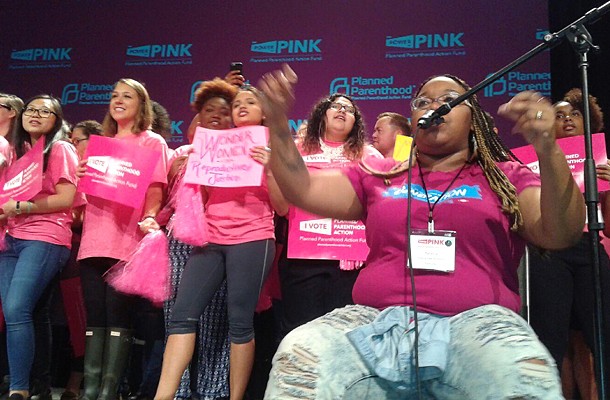
On Saturday morning, hundreds of volunteers dressed in pink, holding signs and waving pink pom poms filled the Spirit of Pittsburgh ballroom at the David L. Lawrence Convention Center to "pink out the vote."
"I'm here to reduce the stigma surrounding women's health," said Stephanie Reynolds, of Pittsburgh, who dressed in a birth-control-pill costume for the rally.
Reynolds was among nearly 1,000 volunteers this weekend, both local and from across the country, who attended the Planned Parenthood Action Fund's national membership conference in Pittsburgh. The two-day event, dubbed "The Power of Pink," trained members on community organizing, media strategies and engaging the public on issues of reproductive and women's health in the months leading up to the election.
The speakers at the Saturday rally included Cecile Richards, president of Planned Parenthood and its Action Fund; Marlon Marshall, of the Hillary for America campaign; Dee Dee Watters, a transgender-rights activist; Rich Fitzgerald, Allegheny County Executive; and Dr. Shelia Ramgopal, a local OB-GYN and abortion provider for Planned Parenthood and Allegheny Reproductive Health Center.
Richards fired up the crowd by listing the names Republican presidential candidate Donald Trump has called women, "bimbos, dogs, and that's just the tame stuff, and we're not going to stand for it."
She called the upcoming election a "turning point." And, acknowledging the split between supporters for Democratic presidential candidates Bernie Sanders and Hillary Clinton, said, "We didn't all start out backing the same candidate, but in the end we're fighting for the same thing." Planned Parenthood has endorsed Clinton.
Many of the speakers railed against increased regulations on abortion providers, like the situation in West Texas; the prohibition of federal funds being used for abortion services; violence against abortion providers, including last year's shooting in Colorado; and discriminatory laws against transgender individuals, citing North Carolina's law regulating bathroom choices.
"Health care is personal," Fitzgerald said to the crowd. "Mr. Trump and his friends are the party of limited government ... except when it comes to women's health."
Last week, Trump promised that if elected, he would appoint Supreme Court justices who would vote against Roe v. Wade.
The conference program instructed volunteers to text "PINK" to a specified number to connect them to their Senator; it also included a script that volunteers could read to their senators, urging "my senator to do their job, and move forward the nomination process for Judge Merrick Garland."
According to a USA Today article published this weekend, Planned Parenthood plans to spend $30 million during this election cycle, the most it will have ever spent during an election.
And Richards summed up her determination to the crowd: "You know what we're going to do? Any damn thing it takes. Together we are going to dismantle the patriarchy and build the nation we deserve."
Tags: Planned Parenthood Action Fund , Power of Pink , #PinkOutTheVote , Pittsburgh , Image
Monday, May 9, 2016
Can air pollution affect the brain? That is the topic of the Group Against Smog and Pollution's (GASP) latest installment of its "Making the Connection" lecture series. (Prior iterations have focused on heart health, autism and outdoor physical activity.) On Wednesday night, GASP will host biology and public-health experts to discuss "Air Pollution and Brain Health."
"When people think about air pollution and health, naturally they think of asthma and respiratory health, but air pollution can affect just about every part of the body," says Rachel Filippini, executive director at GASP. "[Air pollution] is associated with cancer, cardiovascular disease, autism and diabetes, and there have been studies that have connected air pollution to neurological illnesses, including Alzheimer’s disease."
Experts Michelle L. Block, Ph.D., of University of Indiana's School of Medicine, and Jane E. Clougherty, Ph.D., of University of Pittsburgh's Graduate School of Public Health, will speak.
Block's research focuses on the effects of urban pollution on the brain's immune cells.
"These are the coolest cells in the world," Block told City Paper over the phone. "Their normal function is if any pathogens come near the brain, they’re going to send them off. But they’re also basically resident electricians or gardeners in the brain, and they take out the trash when cells die. You would not be normal without this cell."
However, when air pollution is breathed into the lungs, these cells can receive signals and become affected in a bad way, "like the Incredible Hulk" and "can become dangerous to surrounding cells," says Block.
"For example, if you were to breath in just ozone, no other particulate matter, you’re basically giving the equivalent of a sunburn in your lungs. It’s minor. Your lungs are not going to be permanently damaged. But there’s an immune response. Even though that’s in your lung, your brain [immune] cells can detect it, so now they’re hypersensitive. ... My job is to find out why and how do we stop it," Block says.
Clougherty was not available for an interview, but she will present her findings about diesel pollution in Downtown Pittsburgh.
"I think it’s just really important that the public is aware. It’s not just climate change. Air pollution is involved in a lot of health issues. It can kill you. If you survive it, it’s going to affect you," Block says. "We’re still at a stage where we’re figuring out how much is bad. You don’t necessarily need high levels to be affected. The take-home message is we need a lot of research in this area, and it’s important."
5-8 p.m. Wed., May 11. Phipps Conservatory, Oakland. $5 suggested donation. Register here.
Tags: Group Against Smog and Pollution , Making the Connection: Air Pollution and Brain Health , diesel , brain disease , Michelle L. Block , Jane E. Clougherty , Image
Tuesday, March 29, 2016
This week, Democratic U.S. Senate candidate and Braddock Mayor John Fetterman released an ad on the growing heroin epidemic that is affecting Pennsylvania and the U.S.
In the video, Fetterman walks through abandon homes in North Braddock, which neighbors Fetterman's community, calling one of the abandoned homes a "cathedral to addiction" because people broke in and striped the home of what is valuable, like its copper piping, to sell and fuel their drug addiction. (In fact, City Paper wrote in February about another nearby community, Turtle Creek, that is also experience a heroin epidemic.)
"What would our country look like if 30 years ago we didn't declare a war on drugs but we declared a war on addiction and treated it like the medical condition that it is," Fetterman asks in the ad. "How many millions of families lives would not have been damaged or destroyed by seeing their loved ones get sent away for years and years through mandatory sentencing?"
Fetterman's press release points out that more than half of Pennsylvania's drug overdose deaths in 2014 were a result of heroin use, according to a report from the Drug Enforcement Administration. In Allegheny County, opioid overdose deaths were down from 326 in 2014, to 246 in 2015, but the majority of overdose deaths were still caused from opioids (particularly herion) in 2015, according to Allegheny County Office of the Medical Examiner.
Fetterman says in the press release that white suburban neighborhoods have also been experience rising opioid use, but communities of color have been the hardest hit by the epidemic. Fetterman points to his first hand experience as mayor of a community that has experienced such problems as why he wanted to highlight the heroin issue.
The ad is available online and will be showed over the air in select Pennsylvania TV markets.
Pennsylvania's primary election is April 26, and Fetterman is going up against former state environmental secretary Katie McGinty, former U.S. Rep. Joe Sestak, and Findlay township small business owner Joe Vodvarka. To learn more about other issues important to the U.S. Senate candidates, read CP's coverage of their thoughts on affordable housing, fracking, and gun control.
Tags: Pennsylvania , heroin , U.S. Senate , Election 2016 , John Fetterman , overdose , PolitiCrap , Video



